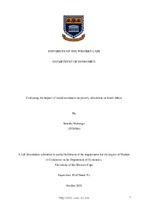| dc.contributor.advisor | Yu, Derek | |
| dc.contributor.author | Mabongo, Sesethu | |
| dc.date.accessioned | 2022-02-22T10:23:00Z | |
| dc.date.available | 2022-02-22T10:23:00Z | |
| dc.date.issued | 2021 | |
| dc.identifier.uri | http://hdl.handle.net/11394/8723 | |
| dc.description | Magister Commercii - MCom | en_US |
| dc.description.abstract | In the past two decades of liberal transformation the post-apartheid Republic of South Africa
has been well described as an upper middle-income economy. Despite the country’s strong
political and economic affiliations with other developed countries, the nation remains till
present faced with socioeconomic impediments deeply rooted within the presence of ceaseless
impoverishment, unemployment and inequality. Likewise, there are various factors that
explain the nature of deprivation. The application of both the money-metric and non-moneymetric
approaches in the conceptualization and measurement of poverty provides an in-depth
understanding of efforts (or lack thereof) to establish an equal standard of living for all. | en_US |
| dc.language.iso | en | en_US |
| dc.publisher | University of Western Cape | en_US |
| dc.subject | Social security | en_US |
| dc.subject | Social grants | en_US |
| dc.subject | Poverty | en_US |
| dc.subject | South Africa | en_US |
| dc.subject | Socioeconomic status | en_US |
| dc.title | Evaluating the impact of social assistance on poverty alleviation in South Africa | en_US |
| dc.rights.holder | University of Western Cape | en_US |

